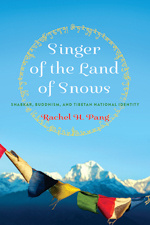Today, we are happy to bring you our conversation with Rachel H. Pang, author of Singer of the Land of Snows: Shabkar, Buddhism, and Tibetan National Identity
What inspired you to write this book?
Shabkar is an amazing poet! I had the privilege of reading his autobiography and poems under the guidance of some great Tibetan teachers and I always thought to myself, wouldn’t it be great if more people could know about these poems? I wrote the book in a way that I hope Tibetan and Buddhist communities will find beneficial and enriching.
What did you learn and what are you hoping readers will learn from your book?
Shabkar is known for his religious songs. But while reading his work, I discovered that there is so much more to him than his songs. Although he flourished almost two hundred years ago, his messages are still relevant – and compellingly so – to contemporary readers.
What surprised you the most in the process of writing your book?
Writing a book is very difficult! And you can really only explore one main theme in detail. Shabkar is such a multi-faceted figure that you could write many books about him.
What’s your favorite anecdote from your book?
At one point, Shabkar travels to the island at the center of Qinghai Lake to do a meditative retreat. He walked over the frozen lake in the winter, bringing along a year’s worth of provisions with him, and stayed on the island until the lake refroze the next winter and he could walk back to the mainland to replenish his provisions. I got a chance to visit the island when I was studying in eastern Tibet. There is still a small group of monks and nuns meditating there!
What’s next?
I’m expanding my research on non-sectarianism to include other thinkers from the Amdo region from the seventeenth through nineteenth centuries. I am also looking at how these figures were representing Tibet in the same period.
I’d also like to start a new project on Asian Canadian/American expressions of Buddhism. I am really inspired by the work of Chenxing Han and others who have uncovered an entire group of American Buddhists whose voices were erased in the mainstream media and I’d like to learn more about their stories and share with a wider audience.





